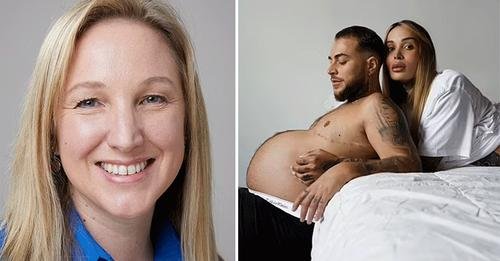What is a woman? It’s the political question of the day, but here’s a related one for you: Can a person born with a penis give birth?
If you know even the basics of anatomy, you’ll probably swiftly answer: ‘No.’ You may even find yourself quoting Monty Python and asking: ‘Where’s it going to gestate? In a box?’
No matter how determined we are to be inclusive, there are some limits to what different humans can do. And for a person with a penis, having a baby is one such limit.
A fact you’d imagine a midwife would know better than most. But the reality, it seems, is rather different.
So much so that a midwifery course at Edinburgh Napier University in Scotland was recently outed by whistleblowing students for attempting to teach them how to catheterise a penis.
Students were told their module on catheterisation — a procedure sometimes done during labour to drain the bladder — had been fully updated, because they ‘may be caring for a pregnant or birthing person who is transitioning from male to female and may still have external male genitalia’.
That’s right: a highly experienced midwifery lecturer with a PhD taught students that a male person could give birth.
If you’re reading this with your face in your hands, I agree that it would be tempting to have a knee-jerk reaction and call for the teacher to be fired.
Surely if a person doesn’t know the absolute basics of biology, they have no place teaching future healthcare providers?
Unfortunately, though, this would not solve the problem, which goes far deeper than just one midwifery lecturer.
We need to ask why this teacher has completely lost touch with reality in this way and the answer, I firmly believe, is because midwifery has been ideologically captured by the trans lobby.
Again and again, through my work as a writer and campaigner for women’s rights in childbirth, I have been approached with frankly dystopian stories showing how in thrall to trans rights midwifery has become.
For example, at one university, I’m reliably informed a visiting lecturer has told students they must refer to ‘birthing people’ rather than ‘women’ in their essays, or face their work ‘being looked upon less favourably’.
Other student midwives, from various courses, have told me they have been instructed to use the terms ‘childbearing individual’ or ‘pregnant people’ to be more ‘inclusive’.
They don’t feel able to object, having fought hard for places on the course. Teachers of midwifery are also under pressure.
Several have contacted me to say they feel compelled to use particular words for fear of risking their jobs.
‘Teaching midwifery now feels like walking on eggshells,’ said one. ‘I feel I have to start each class with a disclaimer on how I define “woman” and “female”.’
Another told of how, when teaching, she must use terms such as ‘women and birthing people’, ‘they’ instead of ‘she’, and replace words such as ‘maternity’ with ‘perinatal’, and ‘breastmilk’ with ‘human milk’.
In spite of reservations about the changes, she feels powerless to argue. It’s all evidence of how the trans debate is becoming an area in which the unscientific beliefs of a small minority are taking precedence over basic facts.
Indeed, last week the head of trans inclusion at campaigning group Stonewall told an industrial tribunal that ‘bodies are not inherently male or female. They are just their bodies.’
This suggests a baffling lack of biological awareness. But it’s not only lobby groups or niche communities on social media who appear to be erasing women from issues concerning their own bodies — you will also see major birth and breastfeeding organisations, and even NHS trusts, falling over themselves to write posts and even policy documents that don’t mention women at all.



